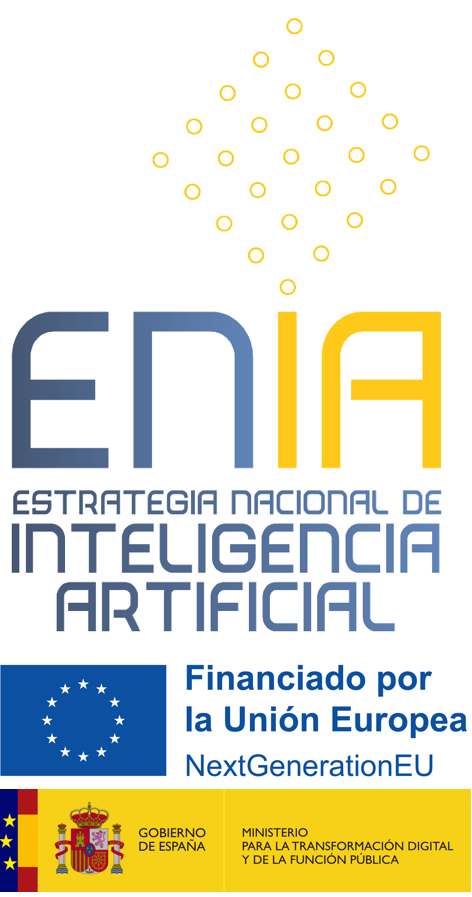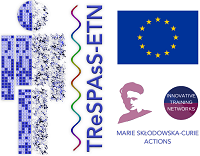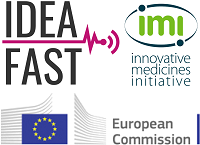Public Funding
Participation as Principal Investigator / Member of the Research Team:
(2023-2026) Cátedra ENIA UAM-VERIDAS en IA Responsable
Title: Cátedra ENIA UAM-VERIDAS en IA Responsable
Type: NextGenerationEU Plan de Recuperación, Transformación y Resiliencia
Code: TSI-100927-2023-2
Funding: ca. 655 Keuros
Website: https://catedraeniauam.github.io/
Participants: Univ. Autonoma de Madrid
Period: January 2023 - December 2026
Principal investigator(s): Julian Fierrez and Ruben Tolosana
Objectives:
- Improve the robustness and security performance of biometric systems against attacks such as DeepFakes, posisoning and backdoor attacks, etc.
- Analysis and proposal of novel methods to reduce the bias in AI models.
- Proposal of novel methods to improve the explainability of the AI models.
- Analysis and proposal of novel methods to detect and mitigate the extraction/use of sensitive information in AI models.
(2025-2026) PowerAI+
Title: Empowering AI Technologies through Large Language/Vision Models and Generative AI with Applications to Security, Health and Human Behavior
Type: Comunidad de Madrid R&D Program
Code: SI4/PJI/2024-00062
Funding: ca. 54 Keuros
Participants: Univ. Autonoma de Madrid
Period: January 2025 - December 2026
Principal investigator(s): Ruben Tolosana
Objectives:
- Exploration and proposal of novel Generative AI methods for the synthesis of data in the scenarios considered.
- Exploration of novel Foundational Models to overcome traditional limitations in Machine Learning and in real-life scenarios.
- Application of the insights in scenarios such as Security, Health, and Human Behavior.
(2022-2024) INTER-ACTION
Title: Human Interaction with Smart Devices in Security and Digital Health Domains
Type: Spanish National R&D Program
Code: PID2021-126521OB-I00
Funding: ca. 220 Keuros
Participants: Univ. Autonoma de Madrid
Period: January 2022 - December 2024
Principal investigator(s): Javier Ortega-Garcia and Ruben Vera-Rodriguez
Objectives:
- Acquire, generate synthetic data, and analyze human-machine interaction data as a ground basis of research.
- Improve the robustness and security performance of biometrics from human-machine interaction data.
- Propose new schemes for human-machine interaction data over time in the digital health and wellness domains.
- Proposal and development of new schemes in the privacy preserving domain to quantify and remove the sensitive attributes contained in human-machine interaction data.
(2021-2024) AI4Food
Title: Inteligencia Artificial para la Prevención de Enfermedades Crónicas a través de una Nutrición Personalizada
Type: Comunidad de Madrid Synergy Program
Code: Y2020/TCS6654
Funding: ca. 310 Keuros UAM (620 Keuros in total)
Participants: Univ. Autonoma de Madrid and IMDEA-Food Institute
Period: July 2021 - June 2024
Principal investigator(s): Javier Ortega-García (UAM technical lead: Aythami Morales)
Objectives:
- AI4Food will develop a series of enabling technologies to process, analyze and exploit a large number of biometric signals indicative of individual habits, phenotypic and molecular data.
- AI4Food will integrate all this information and develop new machine learning algorithms to generate a paradigm shift in the field of nutritional counselling.
- AI4Food technology will allow a more objective and effective assessment of the individual nutritional status, helping experts to propose changes towards healthier eating habits from general solutions to personalized solutions that are more effective and sustained over time for the prevention of chronic diseases.
- AI4Food will also advance knowledge on three questions using these new technologies: 1) WHICH are the sensor dependent and sensor independent biomarkers that work best for nutritional modelling of human behavior and habits? 2) WHEN, that is, under what circumstances (e.g., user habits, signal quality, context, phenotypic and molecular data), and 3) HOW can we best leverage those signals and context information to improve nutritional recommendations.
(2020-2023) TRESPASS-ETN
Title: Training in Secure and Privacy-preserving Biometrics
Type: H2020 Marie Curie Initial Training Network
Code: H2020-MSCA-ITN-2019-860813
Funding: ca. 502 Keuros
Participants: UAM, Univ. Applied Sciences H-DA (Germany), Univ. Groningen (Netherlands), IDIAP (Switzerland), Chalmers Univ. (Sweden), Katholieke Univ. Leuven (Belgium)
Period: January 2020 – December 2023
Principal investigator(s): Massimiliano Todisco (Julian Fierrez and Aythami Morales for UAM)
Objectives:
- To combat rising security challenges, the global market for biometric technologies is growing at a fast pace. It includes all processes used to recognise, authenticate and identify persons based on biological and/or behavioural characteristics.
- The EU-funded TReSPAsS-ETN project will deliver a new type of security protection (through generalised presentation attack detection (PAD) technologies) and privacy preservation (through computationally feasible encryption solutions).
- The TReSPAsS-ETN Marie Sklodowska-Curie early training network will couple specific technical and transferable skills training including entrepreneurship, innovation, creativity, management and communications with secondments to industry.
(2020-2023) PRIMA
Title: Privacy Matters
Type: H2020 Marie Curie Initial Training Network
Code: H2020-MSCA-ITN-2019-860315
Funding: ca. 485 Keuros
Participants: UAM, Univ. of Kent (UK), NTNU (Norway), NR (Norway), Julius-Max Univ. (Germany), Katholieke Univ. Leuven (Belgium)
Period: January 2020 – December 2023
Principal investigator(s): Raymond Veldhuis (Ruben Vera-Rodriguez and Julian Fierrez for UAM)
Objectives:
- To train 14 creative, entrepreneurial, and innovative researchers as privacy protection experts.
- To contribute to a full understanding of the multidisciplinary nature of privacy protection in a digitalised society.
- To contribute to the development of solutions that address this important societal challenge.
(2019-2025) IDEA-FAST
Title: Identifying Digital Endpoints to Assess Fatigue, Sleep and Activities in Daily Living in Neurodegenerative Disorders and Immune-mediated Inflammatory Diseases
Type: H2020 Innovative Medicines Initiative 2 (IMI2) - Research and Innovation Action (RIA)
Code: H2020-JTI-IMI2-2018-15-two-stage-853981
Funding: ca. 40 Meuros in total (ca. 200 Keuros for UAM)
Participants: UAM + 44 more: Janssen, Takeda, Lilly, Pfizer, Sanofi, ECRIN, Cambridge Cognition, Asociación de Parkinson Madrid, Imperial College London, etc.
Period: November 2019 - April 2025
Principal investigator(s): Fai Ng from Newcastle Univ., UK (Julian Fierrez for UAM)
Objectives:
- Fatigue and sleep disturbances are two common and disabling symptoms that affect patients with neurodegenerative disorders (NDD) and immune-mediated inflammatory diseases (IMID). These symptoms are major predictors of poor quality of life and increased healthcare cost. Current questionnaire-based approaches to measure these symptoms have key limitations preventing them from being used as reliable endpoints in clinical trials to evaluate the effect of therapies.
- IDEA-FAST aims to address these issues by identifying novel digital endpoints for fatigue and sleep disturbances that will provide more objective, sensitive and reliable measures of the severity and impact of these symptoms in ecological settings. Such digital endpoints will not only help to gain insight into the underpinning mechanisms of fatigue and sleep disturbances, but will also vastly improve the efficiency of clinical trials, ultimately reducing the time and cost to bring new therapies to patients.
- To identify these digital endpoints, we will follow the recommendations of the Clinical Trials Transformation Initiative (CTTI). We will identify the characteristics that fatigue and sleep disturbances will have impact, then select the digital measures (endpoints) to quantify them, followed by choosing the appropriate digital device/technology accordingly. We will then perform a pilot study to prioritise a few of these candidate digital endpoints for validation. We will test the performance of these digital endpoints in two NDD and four IMID in a large longitudinal study during which extensive relevant clinical data will be collected. If these digital endpoints were validated, we will seek support from EMA/FDA for their qualification. Patient users’ perspective, ethical, data privacy, legal and other regulatory issues will be taken into consideration in all aspects of our proposal.
- The resultant digital biobank from the longitudinal study will become an invaluable resource for future exploitation.
(2020-2021) REAVIPERO
Title: Spanish Network of Machine Learning and Computer Vision for Human Analysis and Robotic Perception
Type: Spanish National R&D Program, Research Network
Code: RED2018-102511-T
Funding: ca. 10 Keuros (Full Project)
Participants: 8 Spanish universities, including Univ. Autonoma de Madrid
Period: January 2020 - December 2021
Principal investigator(s): Filiberto Pla (Julian Fierrez for UAM)
Objectives:
- To foster collaboration between Spanish research groups working in Computer Vision and Pattern Recognition.
(2019-2021) BIBECA
Title: Biometrics and Behavior for Context-Aware and Secure Human-Computer Interaction
Type: Spanish National R&D Program
Code: RTI2018-101248-B-I00
Funding: ca. 243 Keuros
Participants: Univ. Autonoma de Madrid
Period: January 2019 - December 2021
Principal investigator(s): Julian Fierrez and Aythami Morales
Objectives:
- Generating a better understanding about the nature of biometrics in terms of distinctiveness, permanence, and relation to stress levels and emotions. New methods for analyzing and modelling complex yet structured relations on heterogeneous data will be developed in BIBECA.
- Design of robust algorithms in terms of biometric representation and matching from uncooperative users in unconstrained and varying scenarios. BIBECA will contribute in this topic to: innovative adaptive fusion schemes, and public databases with heterogeneous continuous biometrics, in realistic mobile and desktop setups.
- Experimental exploration and technology development towards new biometrics applications: mobile authentication and ubiquitous biometrics.
- Understand and improve the usability of biometric systems.
- Understand and improve the security in biometric systems. BIBECA will track the advances in security against attacks and privacy preservation in biometric systems, and will adapt and investigate those advances for the kind of human interaction signals to be explored during the project implementation.
(2016-2018) COGNIMETRICS
Title: Cognitive Biometric Authentication: Human Interaction for Identification
Type: Spanish National R&D Program
Code: TEC2015-70627-R
Funding: ca. 280 Keuros
Participants: Univ. Autonoma de Madrid
Period: January 2016 - December 2018
Principal investigator(s): Julian Fierrez and Javier Ortega-Garcia
Objectives:
- Proposal and development of novel cognitive authentication schemes based on behavioral biometrics from heterogeneous data sets originating from human-machine interaction.
- Improving the state of the art in continuous authentication systems making use of biometrics.
- Proposal and development of novel user-dependent information fusion schemes, adaptive over time, and making use of context information.
(2013-2015) BIO-SHIELD
Title: Evaluation of Performance and Countermeasures against Attacks and Threats on Biometrics Systems
Type: Spanish National R&D Program
Code: TEC2012-34881
Participants: Univ. Autonoma de Madrid
Period: January 2013 - December 2015
Principal investigator(s): Javier Ortega-Garcia
(2012-2016) BEAT
Title: Biometrics Evaluation and Testing
Type: FP7-SECURITY, CP-FP: Small or Medium-scale Focused Research Project
Code: SEC-2011.5.1-1-284989
Funding: ca. 3.5 Meuros (ca. 530 Keuros for UAM)
Participants: 10 EU Institutions, including Univ. Autonoma de Madrid
Period: March 2012 - February 2016
Principal investigator(s): Sebastien Marcel (Julian Fierrez for UAM)
Objectives:
- Identity management using Biometrics is deployed in a growing number of applications ranging from identification platforms (e.g. biometric passports) to access control systems for border checks or banking transactions. Unfortunately, the reliability of these technologies remains difficult to compare. There are no european-wide standards for evaluating their accuracy, their robustness to attacks or their privacy preservation strength.
- BEAT will fill this gap by building an online and open platform to transparently evaluate biometric systems, designing protocols and tools for vulnerability analysis and developing standardization documents for Common Criteria evaluations. The planned impact is three-fold: the reliability of biometric systems becomes standardized and comparable, potentially leading to a meaningful increase in their performance; technology transfer from research to companies becomes easier with the use of an interoperable framework; authorities and decision-makers become more informed about the progress made in biometrics as results impact standards.










